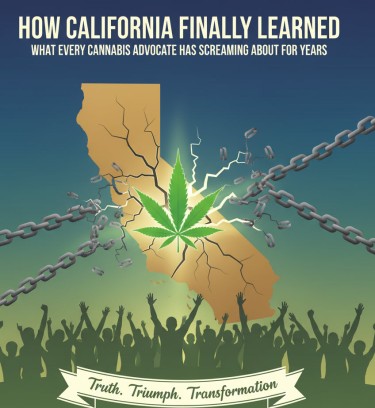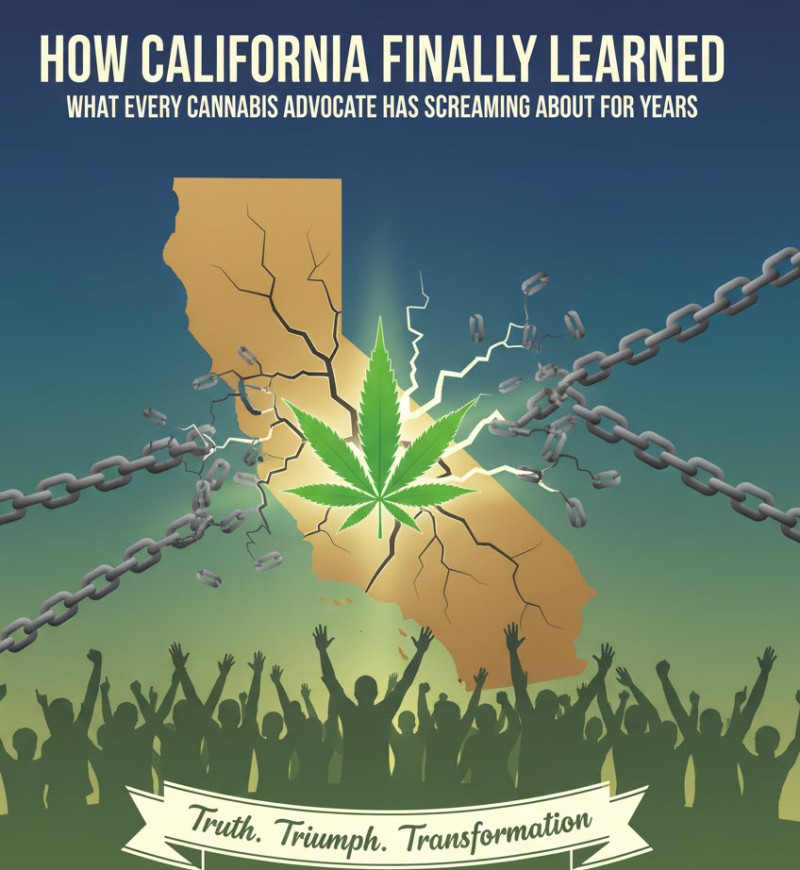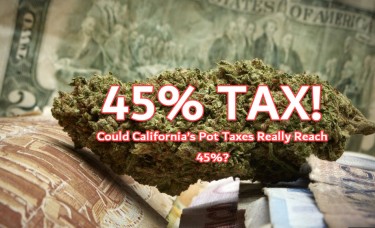
I Hate Being Right: How California Finally Learned What Every Cannabis Advocate Has Been Screaming for Years
Sometimes being right sucks, especially when you've been screaming the same obvious truth into the void for years while watching policymakers ignore basic economic principles. That's exactly how I feel watching California scramble to slash cannabis taxes in a desperate attempt to compete with the illegal market they accidentally supercharged through their own greed.
Let me be clear: every cannabis advocate worth their salt saw this coming from miles away. When California legalized recreational cannabis in 2016, we warned that stacking state taxes on top of local taxes on top of federal tax penalties would create an unsustainable burden on legal businesses. We pointed out that the black market doesn't pay taxes, doesn't follow regulations, and doesn't give a damn about compliance costs. Simple math suggested that over-taxing legal cannabis would be like handing the illicit market a competitive advantage on a silver platter.
But did anyone listen? Of course not. Politicians saw dollar signs, not sense. They envisioned cannabis as a cash cow that would fund everything from schools to roads to their pet projects. Local governments piled on additional taxes and fees, creating a regulatory nightmare where legal cannabis could cost 40-50% more than street weed in some jurisdictions.
Now, after years of legal businesses struggling to survive while cartels laugh all the way to the bank, California is finally admitting what we've been saying all along: you can't tax your way to successful legalization if you price yourself out of the market.
Governor Newsom's emergency tax reduction package represents a tacit admission that California's approach has been fundamentally flawed. But here's what really grinds my gears – this could have been avoided entirely if policymakers had listened to the people who actually understand cannabis markets instead of treating us like naive stoners who don't understand "real economics."
The truth is, the only real way to beat the black market isn't through taxation or regulation – it's through offering something better. And sometimes, that something better needs to be free, or at least accessible enough that people choose legal over illegal for reasons beyond just price.
Today, we're going to explore how California's tax reduction proves what advocates have known all along, and why even these reforms don't go far enough to create a truly sustainable legal cannabis market.
The Predictable Disaster: How Over-Taxation Became Black Market Subsidies
When California implemented its recreational cannabis tax structure, it was like watching a slow-motion car crash unfold. We had state excise taxes, cultivation taxes, local taxes, and sales taxes all piling up on legal cannabis products. In some jurisdictions, the total tax burden reached absurd levels – sometimes adding 40-50% to the final retail price.
Meanwhile, your neighborhood dealer continued operating with the same overhead he'd always had: zero taxes, zero compliance costs, zero regulatory burden. Basic economics suggests that when you artificially inflate the price of legal goods while leaving illegal alternatives untouched, you're essentially subsidizing the black market. That's exactly what happened.
The numbers tell the story better than any politician's promises. Despite California being the largest cannabis market in the world, legal sales have consistently underperformed projections while illegal operations have thrived. Counties like Los Angeles have seen dispensaries close at alarming rates while unlicensed shops proliferate like weeds (pun intended).
But here's the part that really burns me up: this was entirely predictable. Cannabis advocates weren't making wild guesses when we warned about over-taxation. We were applying basic economic principles that any first-year business student could understand. When you create a significant price differential between legal and illegal versions of the same product, consumers will gravitate toward the cheaper option, especially when quality differences are minimal.
The cannabis community tried to explain this to lawmakers, but we were dismissed as biased stakeholders who just wanted lower taxes. Meanwhile, legislators listened to consultants who promised that cannabis consumers would pay premium prices for the privilege of legal access. They were wrong, and we were right, but legal businesses and their employees paid the price for this miscalculation.
What makes this even more frustrating is that other states and countries have provided clear examples of what works and what doesn't. Colorado started with reasonable tax rates and gradually adjusted based on market response. Canada implemented a federal excise tax structure that, while imperfect, avoided the multi-layered taxation disaster that California created.
The black market didn't just benefit from lower prices – it got a massive competitive advantage that legal businesses couldn't overcome through superior products, better customer service, or regulatory compliance. When legal cannabis costs twice as much as street weed, all the fancy packaging and lab testing in the world won't convince price-conscious consumers to choose the legal option.
California's recent tax cuts represent an acknowledgment of this reality, but they might be too little, too late. Years of over-taxation have allowed illegal operations to become entrenched, building distribution networks and customer bases that won't disappear overnight just because legal prices become slightly more competitive.
The real tragedy is that this damage was entirely avoidable. If California had implemented reasonable tax rates from the beginning, or better yet, adopted a more innovative approach to cannabis regulation that prioritized market capture over revenue generation, we could have been looking at a thriving legal industry instead of a struggling one that's still fighting for market share against cartels.
The Two-Tier Solution: Why Free Markets Beat Black Markets
Here's the thing that drives me absolutely crazy about cannabis legalization: policymakers keep trying to apply traditional business models to a market that operates under completely different rules. They're fighting the black market with one hand tied behind their back, using regulations and taxes as weapons when they should be using freedom and accessibility.
I've long advocated for what I call a two-tier cannabis system that would actually make sense for both consumers and businesses. The concept is simple: create one tier for small-scale, community-based operations and another for large commercial enterprises, with dramatically different regulatory approaches for each.
Tier 1 would be the people's tier – allowing individuals or small collectives to generate up to $1 million in profit annually with minimal regulatory burden. We're talking about a $1,000 annual license fee and regulations similar to a farmer's market. You can grow, process, distribute, and sell directly to consumers through peer-to-peer networks, small dispensaries, or community markets. This tier operates on the principle that cannabis is fundamentally just a plant that people should be free to cultivate and share.
The beauty of this approach is that it directly competes with the black market on the black market's own terms. Low overhead, minimal bureaucracy, direct relationships between producers and consumers. But unlike the black market, it's legal, trackable, and subject to basic safety standards.
Tier 2 would be the corporate tier for operations exceeding $1 million in annual profit. These businesses would pay $10,000 annual license fees and face significant regulatory requirements in exchange for access to major retail channels like Walmart and 7-Eleven. They'd operate under strict quality control standards, extensive testing requirements, and corporate responsibility mandates including community reinvestment programs.
This creates a natural market segmentation that serves different consumer preferences and business models. Want artisanal, small-batch cannabis from someone in your community? Tier 1 has you covered with competitive prices and personal relationships. Want mass-market convenience products with consistent quality? Tier 2 provides that with corporate reliability and widespread availability.
The key insight is that you beat the black market by offering something better, not just something legal. Tier 1 offers the personal touch and competitive pricing that black market customers value, while Tier 2 offers the convenience and quality assurance that mainstream consumers prefer.
Under this system, legal cannabis would actually be more attractive than illegal alternatives. Tier 1 operations could match black market prices while offering legal protections and quality transparency. Tier 2 operations could provide convenience and reliability that the black market simply can't match.
But here's why this probably won't happen: it doesn't generate enough tax revenue to satisfy politicians, and it doesn't create enough regulatory capture to satisfy corporate interests. The current system, despite its obvious failures, serves the interests of lawmakers who want tax revenue and large companies who can afford compliance costs while their smaller competitors get crushed.
California's recent tax cuts are a step in the right direction, but they're still operating within a fundamentally flawed framework that prioritizes government revenue over market functionality. Until we're willing to completely reimagine how cannabis legalization should work, we'll continue having these predictable problems.
Learning the Hard Way: California's Expensive Education
California's cannabis tax reduction represents one of the most expensive lessons in basic economics in recent memory. After years of watching legal businesses struggle while cartels prospered, the state is finally admitting what cannabis advocates have been saying all along: over-taxation kills legal markets.
But let's be honest – these tax cuts are damage control, not genuine reform. California is trying to fix a fundamentally broken system with incremental adjustments when what's needed is complete reimagining of how cannabis legalization should work.
The real lesson here isn't just about tax policy – it's about the importance of listening to stakeholders who actually understand the markets you're trying to regulate. Cannabis advocates weren't opposing taxation out of greed; we were warning about predictable economic consequences based on real-world understanding of how these markets function.
Other states considering legalization should take note: you can't tax your way to successful cannabis policy. Success comes from creating legal frameworks that actually compete effectively with existing illegal markets, not from treating cannabis as a limitless revenue source.
California's experience proves that good intentions and revenue projections aren't enough to create effective policy. You need to understand market dynamics, consumer behavior, and competitive realities. Most importantly, you need to listen to the people who've been living and breathing these issues for decades.
The question now is whether California's lesson will prevent other states from making the same expensive mistakes, or whether each jurisdiction will insist on learning these lessons the hard way. Based on political history, I'm not optimistic, but at least now we have California's billion-dollar case study to point to.






